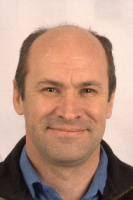
This lecture the principal features of effective and ineffective presidencies in thetwentieth century. Every successful president has been a pragmatic visionary who managed to create a consensus for his policies as well as a fund of public personal affection.
Robert Dallek is a prominent historian specializing in the study of American presidents and U.S. diplomacy. He is a former Professor of History at Boston University, Columbia, UCLA, Oxford, Dartmouth, and Stanford. He won the Bancroft Prize in 1980 and many other awards for his scholarship and teaching. Among his numerous books are acclaimed biographies of Lyndon Johnson, John F. Kennedy, and, most recently, Nixon and Kissinger: Partners in Power (2007).
Robert Dallek's talk was part of the Branigin Lecture Series on Thinking about the Election.
The Shape of the Campaign: Composition and Dynamics in the 2008 Election
Charles H. Franklin
September 30, 2008, Woodburn Hall 120

Elections are driven by long-term social structures and by short-term campaign dynamics. This lecture shows how the two are connected and how the campaign has developed so far.
Charles H. Franklin is Professor of Political Science at the University of Wisconsin-Madison who studies statistical methods, elections and public opinion. His articles on partisanship, public opinion, the Supreme Court, and U.S. Senate elections have appeared in major journals. His current work focuses on Bayesian (probabilistic) models of election campaigns and polling data.
The Bush Legacy and the 2008 Elections
Gary C. Jacobson
October 15, 2008, Woodburn Hall 120

This talk examine the consequences of the Bush administration and its policies for the popular images of the Republican and Democratic parties and for mass party identification, especially among young voters. It then considers the implications of these consequences and of related national political conditions for the congressional and presidential elections of 2008.
Gary C. Jacobson is Professor of Political Science at the University of California, San Diego whose research areas encompass congressional elections, American politics, and American political parties. Among his books are: Politics of Congressional Elections; A Divider, Not a Uniter: George W. Bush and the American People; and Money in Congressional Elections.
Torture, Democracy, and our Future
Darius Rejali
October 21, 2008, Woodburn Hall 101

The speaker will examine the long history of modern torture, from the late nineteenth century to the aftermath of Abu Ghraib, as well as the controversial question whether torture really works. He will reach surprising and troubling conclusions about the relationship of torture to democracy and the consequences of torture for democracies that use it, consequences that elections may not have in their power to alter.
Darius Rejali is Professor of Political Science at Reed College and an internationally recognized expert on government torture and interrogation. His recent book, Torture and Democracy (Princeton, 2007), is a trenchant account of the use of torture by democracies in the 20th century and has won the 2007 Human Rights Book of the Year Award from the American Political Science Association.
In Praise of Overreading
Colin J. Davis
November 12, 2008, University Club, Indiana Memorial Union

The lecture will consider how philosophers such as Martin Heidegger, Jacques Derrida, and Stanley Cavell have gone about interpreting literature and film. It will discuss the possibilities and limits of interpretation and the problem of deciding when an interpreter has gone too far.
Colin J. Davis is Professor of French at the School of Modern Languages, Literatures, and Cultures, Royal Holloway, University of London, U.K. His principal research focuses on twentieth-century French literature, film, and thought. He’s currently Visiting Professor in the Department of French & Italian.

